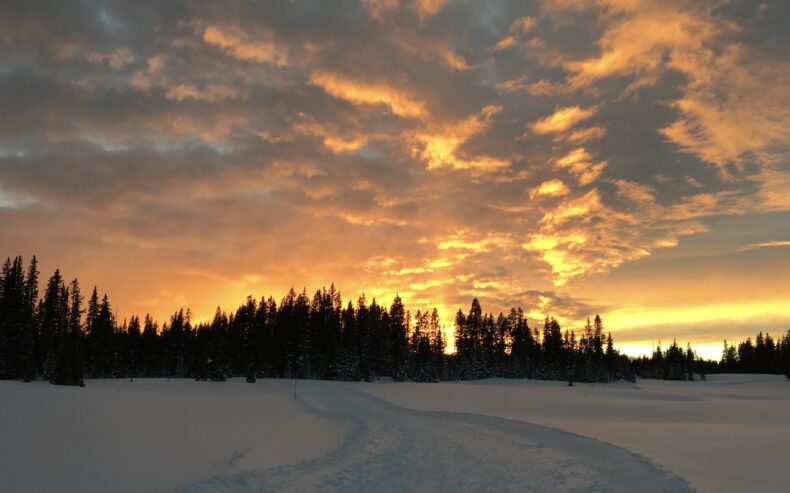
Last week on my podcast, my co-host and bestie Rosemerry asked me the last time I’d experienced awe. The honest truth was, I experience it almost every evening this time of year. For reasons that I’ll explain shortly, winter sunsets are the best sunsets. They are very often awe-inducing, and that means that they’re good for you. As author Florence Williams explains in our recent episode and her book, The Nature Fix, awe can spark creativity and invite the muse. Awe can open us up and connect us to the world around us. Try it! The piece below first appeared here on February 26, 2021, but it’s just as relevant now.
*
This post began with a question from my dear friend, the novelist and documentary filmmaker George Lerner.
Looking over two years of footage from South Texas, I noticed something striking: I have lots and lots of glorious images filmed around sunset, but scant few decent shots at sunrise. Why is this, I wondered — is there a difference from an optical or geophysical perspective between sunset and sunrise?
George copied me on this question he sent to my dad, who has taught atmospheric physics. (How the three of us became close like family is a story for another day.)
I had a knee-jerk answer to George’s question: the reason that sunsets are more amazing than sunrises is that you just see a hell of a lot more of them. So I chuckled to myself when I saw that Dad’s reply to George began, “I try to avoid the early morning hours so I do not see many sunrises.” (Neither of us are morning people.)
But it turns out that there’s more to it than just selection bias. There are scientific reasons that sunsets might be more scenic than sunrises.
Dad writes:
Generally speaking, the air in the morning is more stable and less polluted with particles that scatter light. Also the atmosphere heats up during the day and there is vertical movement of air which contributes to the formation of cumulus clouds that make for a better visual view of the setting Sun.
There’s some truth to that old saying, “Red sky at night, sailor’s delight; red sky in morning, sailors take warning.” “Those spectrally pure colors are telling you there’s a sizable swath of clear air off to your west that’s likely to be over you the next day,” National Oceanic and Atmospheric Administration (NOAA) meteorologist Stephen Corfidi told National Geographic.
It’s now possible to look up your sunrise and sunset forecast. SunsetWx provides predictions for sunrises and sunsets. Here’s how they describe their methodology:
We quickly realized that some things were more important than others, and decided on a weighting scheme. After many trial runs and verifications, we weighted moisture the most…Pressure, as well as the change in pressure over time was the next highest weighted factor as it helps recognize areas where cloud cover may dominate as well as FROPA’s. Finally, we included general cloud cover, to better account for regions where it is overcast, and help the model display it that way.
SunsetWx gives the highest weight to high clouds, and consider them necessary for a “vivid” sunset. Any place that has close to 100 percent cloud cover or is predicted to have precipitation during sunset (or sunrise) gets a “poor” rating.
One thing I’ve noticed over the years is that winter sunsets are especially amazing. I wondered if I thought that partly because I live in a place that’s surrounded by mountains, and the alpenglow on snowy peaks is hard to beat. But I’m not imagining it, according to Stephen F. Corfidi at NOAA’s Storm Prediction Center, fall and winter really do produce the most spectacular sunsets. His explainer is worth reading in full.
The takeaway is that if you’re seeking a spectacular display of light, sunsets are a better bet than sunrises and fall and winter are the best seasons. So if you’re living in the northern hemisphere, go out and enjoy peak sunset season!
Image: sunset over the ski trails at County Line on Grand Mesa by Christie Aschwanden
One thought on “Winter Sunsets Are the Best Sunsets”
Comments are closed.